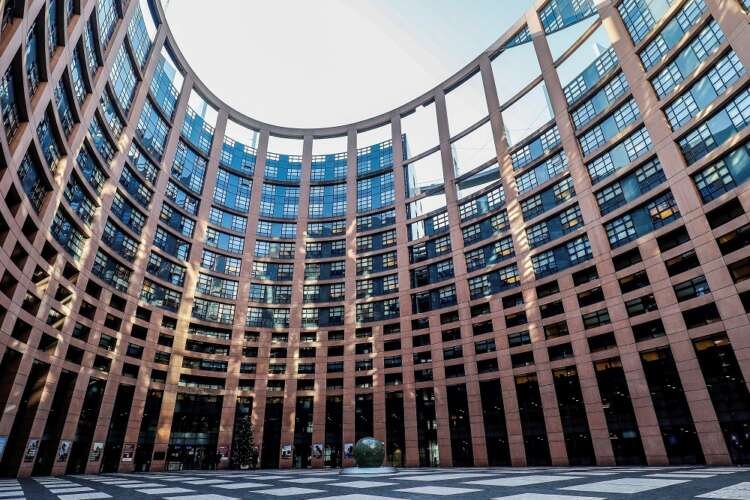Factbox-What’s on the table in EU parliament’s bumper climate vote?


By Kate Abnett
BRUSSELS (Reuters) – The European Parliament will vote on Wednesday on eight climate change policies to slash emissions faster this decade, with outcomes uncertain as lawmakers are split on whether to boost or weaken the plans.
The package of proposals aims to deliver the 27-country European Union’s target of reducing net greenhouse gas emissions 55% by 2030, from 1990 levels.
With the EU racing to wean itself off Russian energy, Brussels is also touting the policies as a way to hasten the switch from imported fossil fuels to locally produced green energy.
Many are headed for tight votes, which will set parliament’s position for upcoming negotiations with EU countries on the final laws.
CARBON MARKET REFORM
The biggest proposal is an upgrade of the EU’s carbon market, the bloc’s core emissions-cutting tool, which forces industry and power plants to pay when they emit CO2.
In Wednesday’s vote, some lawmakers will attempt to reinforce the scheme to deliver a 67% emissions cut by 2030 – higher than the 61% initially proposed by the European Commission, which drafts EU laws. Others expect a 63% compromise to win.
The proposals would add shipping to the carbon market and hike pollution costs for airlines. One amendment would make it easier for policymakers to intervene if CO2 prices spike, while another would restrict financial speculators from trading – a move designed to stop them influencing prices, but which could limit liquidity in the market.
NEW CARBON MARKET
Meanwhile, parliament may scale back a new EU carbon market imposing CO2 costs on polluting fuels used in buildings and transport from 2025.
Some lawmakers fear the measure would raise household bills, although supporters point to recent high energy costs that have been driven predominantly by fossil fuel prices. Lawmakers will also vote on a fund to use revenues from the new market to help poorer households switch to clean energy.
A compromise deal to be voted on would restrict the scheme to the commercial sector, exempting private consumers until at least 2029. Brussels has warned that could see the EU miss its climate targets.
CLEAN CARS BY 2035
Transport produces a quarter of Europe’s planet-heating emissions. The EU has proposed a 100% cut in CO2 emissions from new cars by 2035 – effectively banning new combustion engine car sales, unless carmakers can transform them to be carbon-free.
The EPP, parliament’s biggest lawmaker group, will seek on Wednesday to weaken that to a 90% CO2 cut – allowing 10% of new cars in 2035 to run on polluting fuels.
Carmakers, including Volkswagen, already plan to stop selling combustion engine cars in Europe by 2035. But emails seen by Reuters show auto industry groups have lobbied lawmakers to reject the 2035 target, which they say penalises alternative low-carbon fuels. EU officials expect a tight vote.
CARBON BORDER TARIFF
A close vote is also expected on the EU’s world-first plan to impose a CO2 levy on imports of carbon-intensive goods like steel and cement.
A contentious detail is how quickly this will replace the free CO2 permits those industries currently receive to help them compete with firms abroad in countries with weaker climate policies. Options up for the vote include a free CO2 permit phase-out by 2030, 2032 or 2035. Industries have urged lawmakers not to pull forward the date, which would hike the price they pay to pollute.
NATIONAL EMISSIONS TARGETS, CARBON SINKS
The EU sets national targets for countries to cut emissions in sectors like transport and buildings. Those targets need to get tougher to hit climate goals, and lawmakers are considering stricter rules to avoid countries dodging emissions cuts and relying on others to pick up the slack.
Lawmakers will consider a separate law requiring countries to cultivate forests, wetlands and improve soil health to store more CO2 in these natural “carbon sinks”.
(Reporting by Kate Abnett; Editing by John Chalmers and Bernadette Baum)
A carbon market is a trading system for companies to buy and sell allowances for greenhouse gas emissions. It aims to reduce overall emissions by setting a cap and allowing trading of emission credits.
Carbon sinks are natural systems, such as forests and wetlands, that absorb more carbon dioxide than they emit. They play a crucial role in mitigating climate change by storing carbon.
The EU aims to reduce net greenhouse gas emissions by 55% by 2030 compared to 1990 levels as part of its climate change policies.
A carbon border tariff is a tax imposed on imported goods based on their carbon emissions during production. It aims to level the playing field for domestic producers adhering to stricter emissions standards.
Explore more articles in the Top Stories category











